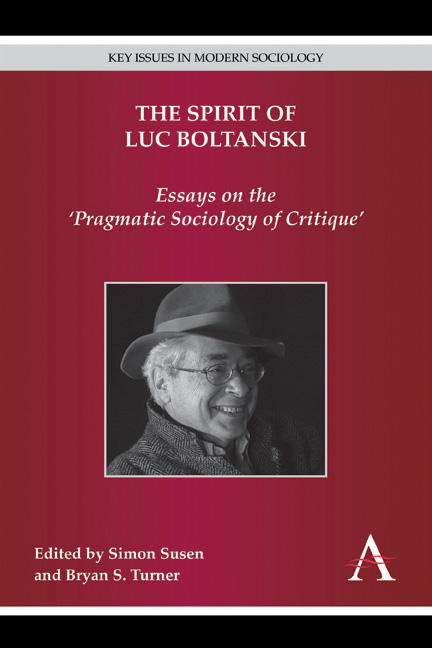Book contents
- Frontmatter
- CONTENTS
- List of Contributors
- Preface
- Part I Introductory Remarks
- Luc Boltanski: His Life and Work – An Overview
- Three Theories of Justice: Preliminary Reflections
- The Spirit of Luc Boltanski: Chapter Outline
- Part II Luc Boltanski and (Post-) Classical Sociology
- Part III Luc Boltanski and Pragmatism
- Part IV Luc Boltanski and Critique
- Part V Luc Boltanski and Critical Sociology
- Part VI Luc Boltanski and Political Sociology
- Part VII Luc Boltanski and Contemporary Issues
- Part VIII Luc Boltanski in Conversation
- Part IX Luc Boltanski and His Critics
- Index of Names
- Index of Subjects
Three Theories of Justice: Preliminary Reflections
from Part I - Introductory Remarks
Published online by Cambridge University Press: 05 December 2014
- Frontmatter
- CONTENTS
- List of Contributors
- Preface
- Part I Introductory Remarks
- Luc Boltanski: His Life and Work – An Overview
- Three Theories of Justice: Preliminary Reflections
- The Spirit of Luc Boltanski: Chapter Outline
- Part II Luc Boltanski and (Post-) Classical Sociology
- Part III Luc Boltanski and Pragmatism
- Part IV Luc Boltanski and Critique
- Part V Luc Boltanski and Critical Sociology
- Part VI Luc Boltanski and Political Sociology
- Part VII Luc Boltanski and Contemporary Issues
- Part VIII Luc Boltanski in Conversation
- Part IX Luc Boltanski and His Critics
- Index of Names
- Index of Subjects
Summary
Introduction: On Simplification
All scientific work starts with some simplification of basic concepts. Once these have been defined and established, we begin to pile up empirical variations. During this process, the simplifying notions are modified and, eventually, they may disappear. For example, economics assumes scarcity, and hence the need to rationalize and economize; politics presupposes the existence of struggles to maximize power; and sociology insists upon the necessity of social solidarity. Taking our cue from the etymology of socius, sociology is the science of companionship or friendship. For social science as a whole, civil society is the space in which these somewhat contradictory assumptions about markets, states, civil institutions, and shared values find a place and are played out. We can further modify these presuppositions: we can say that civil society is caught in another structuring principle – namely ‘the sacred’ and ‘the profane’. This dimension was one aspect of the anthropology of Clifford Geertz (1973), who connected ‘the sacred’ to sovereignty and core power holders, while ‘the profane’ was related to peripheral positions. Charismatic authority and conflicts over charisma involve political struggles to control the core. While this particular assumption about a sacred and secular binary turns out to be historically variable, it provides a starting point (Turner, 2013).
Now moving away from simplification, it is clear that finding agreements in civil society in the contemporary world appears to be increasingly problematic – partly, at least, because of the global fluidity of the labour market, the creation of diasporic communities, the growth of parallel communities, and the failure of traditional forms of citizenship to adjust to social complexity. While all human groups tend to create exclusionary boundaries between ‘the inside’ and ‘the outside’, the potential for conflicts between majorities and minorities have increased with globalization, and these social tensions are expressed in widespread xenophobia. In my own work, I have argued that the paradox of globalization may be to create social enclaves, and we can observe this development through the growth of gated communities and the erection of physical walls to separate communities (Turner, 2007).
- Type
- Chapter
- Information
- The Spirit of Luc BoltanskiEssays on the 'Pragmatic Sociology of Critique', pp. 29 - 48Publisher: Anthem PressPrint publication year: 2014



